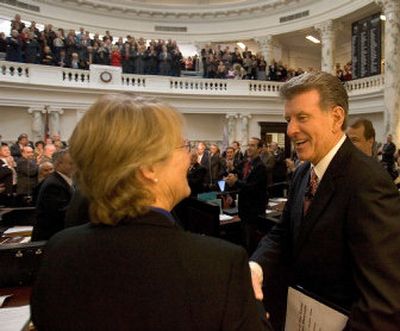Otter lays out his agenda

BOISE – An ebullient Gov. Butch Otter laid out his vision for Idaho on Monday, calling for $22 million in credits to mitigate the sales tax on groceries for low-income residents, eliminating a large state agency, and moving to a “pay as you go” approach for new buildings and other new initiatives.
“I am recommending that we neither significantly expand existing programs nor add any major new initiatives,” Otter told a joint session of the Legislature in his first State of the State message. “There is no doubt that Idahoans want leaner, more efficient and effective state government.”
Otter proposed his first state budget, a $2.84 billion spending plan that’s a 9.6 percent increase from this year, but he noted it’s a “modest 3.1 percent increase in our base operating budget.” The remainder of the spending is in one-time expenditures from the state surplus, for initiatives such as an endowment for needs-based scholarships for Idaho college students and paying up front to build new nursing education buildings.
Senate Finance Chairman Dean Cameron, R-Rupert, said, “We know Butch’s style. He’s fiscally conservative, he believes in personal responsibility, he believes in trying to make government efficient and effective as much as possible. What I love about it is he’s very straightforward in his budget … no smoke and mirrors.”
House Assistant Minority Leader George Sayler, D-Coeur d’Alene, called the speech “pretty vintage Otter,” saying it outlined a “pragmatic approach” to the state budget that included few new programs. But Sayler said Otter neglected early childhood education. “We know that early childhood education pays significant dividends, both economically and in personal development, so I would have liked to have seen something there,” he said.
A centerpiece of Otter’s proposal is to sharply increase the grocery tax credit for the neediest Idahoans. People with the lowest incomes – a fifth of the population – would see the credit rise to $90 a year, up from $20. The credit amount would decline as incomes rise, down to zero for those whose household incomes are 240 percent or more of the poverty level, or about $50,000 a year for a family of four.
It’s the low-income who need to benefit from the big, new $22 million initiative, said Otter, himself a millionaire. “Butch Otter’s not going to get any money at all. What we’re trying to do, obviously, is relieve them of an extra burden that they have in the purchasing of their groceries.”
Sen. Jim Hammond, R-Post Falls, praised the approach: “It’s unfair in that it’s a disproportionate tax on their minimal level of income, so I think that’s the way to do it, rather than do it carte blanche.”
Idaho’s sales tax was 5 percent until recently. State lawmakers raised the tax to 6 percent in a special session in August, but they didn’t address the tax on groceries. Idaho is one of nine states that tax groceries.
Sen. Shawn Keough, R-Sandpoint, favors eliminating the sales tax on groceries, but she’s backing an increased credit as a compromise. “I think most Idahoans agree that we need to significantly increase the credit if we do nothing else, so I applaud him (Otter) for that,” she said.
Otter’s plan also would make the grocery tax credit available to those not required to file state income tax returns. It would exclude anyone receiving food stamps for whichever months they received the benefit.
Otter also called for eliminating the state Department of Administration, a department that his budget director, Brad Foltman, said has grown over the years into “kind of a multiheaded monster.” Otter plans to divide the department’s duties among other agencies and contract some out to private firms. He’ll do the same with the state Division of Human Resources.
“The governor sent a clear message of how he plans to redesign things,” said Sen. Mike Jorgenson, R-Hayden Lake. “The pay-as-you-go, I think it’s wonderful.”
Otter proposed spending $8.2 million for payoffs on some state bonds to save on interest.
Rep. Bob Nonini, R-Coeur d’Alene, applauded Otter’s call to grant merit raises averaging 5 percent to long-underpaid state employees. “I think it shows an aggressive nature to his administration to bring people up to where they should be,” Nonini said. “It’s encouraging because we need to take care of our people in state government.”
Sayler said the raises are good, but he worries increased medical costs might offset them. “I don’t know if we’re making any progress,” he said. “It doesn’t seem to be any real gain for employees.”
Otter recommended fully funding the next phase of the GARVEE bonding program for highways, but leaving decisions on which projects to target to the state transportation board. Grant Anticipation Revenue Vehicles, or GARVEE bonds, are paying for initial work on six major highway projects totaling $200 million, including significant upgrades to U.S. Highway 95.
The next $264 million round of bonding would fund additional work on those same six projects, according to the Idaho Transportation Department’s plan, plus a seventh in the Twin Falls area.
Sen. Joyce Broadsword, R-Sagle, said continuing the GARVEE program is key for North Idaho, especially for Highway 95. “Hopefully we’ll be able to put that money on the ground as soon as possible,” she said.
Senate President Pro Tem Bob Geddes, R-Soda Springs, said Otter gave him a copy of his speech on Sunday, and he passed it on to his Senate leadership team. That way, there were no surprises when the governor spoke. Geddes said he can’t remember that happening in his more than twelve years in the Legislature.